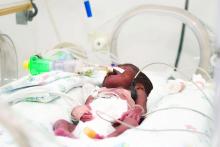Caffeine for apnea of prematurity was neurobehaviorally safe and significantly improved fine motor coordination, visuomotor integration, visual perception, and visuospatial organization at 11-year follow-up, according to the results of a double-blind, randomized, controlled trial.
“There was little evidence for differences between the caffeine and placebo groups on tests of general intelligence, attention, executive function, and behavior. This highlights the long-term safety and efficacy of caffeine therapy for apnea of prematurity in very-low-birth-weight neonates,” wrote Ines M. Mürner-Lavanchy, PhD, of Monash University, Clayton, Australia, and her associates. The Caffeine for Apnea of Prematurity (CAP) trial, the first to assess long-term neurobehavioral outcomes of neonatal caffeine therapy, was published online April 11 in Pediatrics.
Apnea of prematurity affects more than half of preterm neonates. Respiratory stimulation with caffeine therapy is standard care, having been shown to improve disability-free survival and gross motor skills. In this randomized, multicenter, double-blind trial, very-low-birth-weight infants (500-1,250 g) received either normal saline placebo or caffeine citrate (20 mg/kg loading dose, followed by 5 mg/kg daily maintenance dose; could be increased to up to 10 mg/kg for refractory apnea). Patients started treatment at a median of 3 days and were weaned off by postmenstrual age 35 weeks.Neonatal caffeine therapy significantly lowered the risk of death before 18 months, cerebral palsy, cognitive delay, severe hearing loss, and bilateral blindness, as has been reported (N Engl J Med. 2007;357:1893-902). By 5 years, caffeine no longer showed significant benefits, apart from improved motor performance, Dr. Mürner-Lavanchy and her associates noted.


